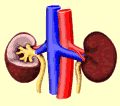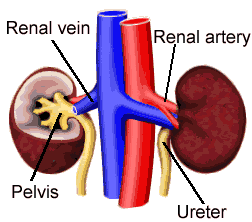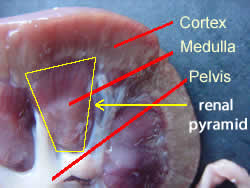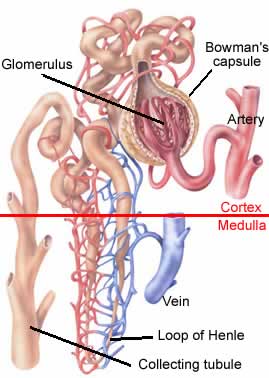
The kidneys are part of the urinary system. This system includes the kidneys, ureters, bladder and urethra. From the pelvis of the kidney, each ureter carries urine to the bladder. The bladder is a muscular reservoir which periodically empties to the outside through a tube called the urethra. The kidneys filter 100 mls of fluid every minute but only 1ml of this finds its way into the bladder. The kidney reabsorbs 99% of the filtrate it produces and is responsible for removing waste products from the body by a process of filtration and selective reabsorption.
The kidneys maintain the concentrations of solutes in our blood and level of fluids in our body. They remove metabolic wastes, poisons, and excess ions taken in through the diet. The kidneys have a number of specific functions which are briefly outlined below.
1) Removing, from the body, nitrogenous wastes accumulating as a result of protein breakdown.
2) Reacting to hormonal signals in the regulation of blood volume and chemical composition.
3) Maintaining appropriate blood concentrations of salts and pH.
Less vital functions include
4) Secreting hormones such as renin, that helps regulate blood pressure and erythropoietin that stimulates the production of red blood cells.
5) Chemically changing vitamin D from an inactive to an active form.

During dissection, the internal structure of the kidney is revealed, at a macro level. The different structures are shown labeled on the right. We can see the brown coloured renal cortex, pink renal medulla and the white renal pelvis. The renal medulla is made of a collection of sections known as renal pyramids. What is not visible are the millions of tiny filtering units called nephrons that carry out the process of filtration.

Although the kidneys are considered to be the body's filters they in fact house millions of tiny filtering units known as nephrons.
A nephron is shown on the right. It extends from the outer layer of the kidney known as the cortex through to the medulla.

What are the stages of urine formation?
The urine concentrates in the